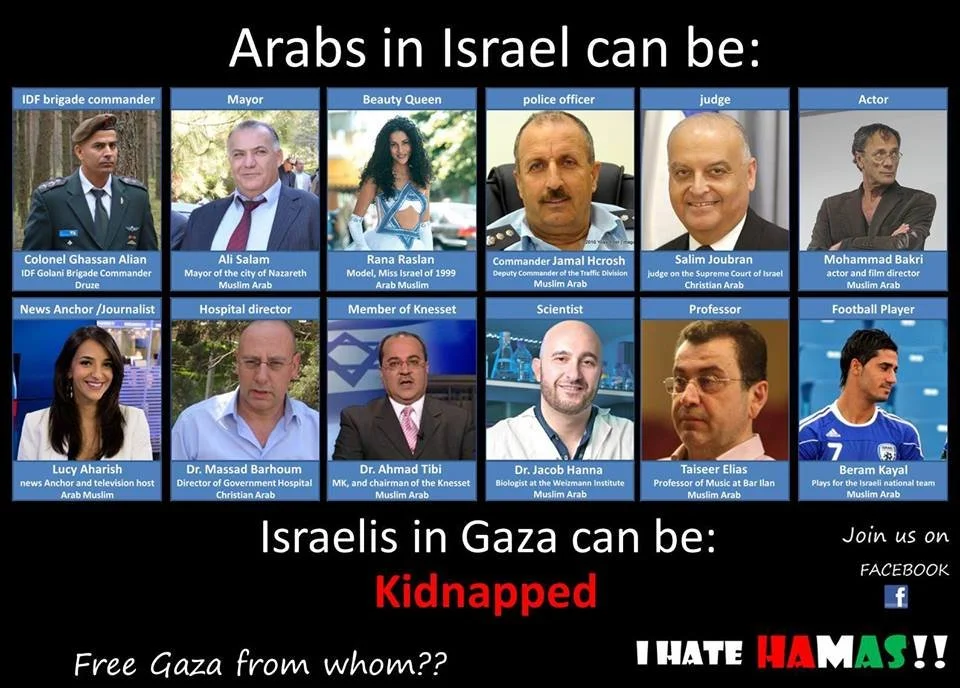Common Misconceptions About the Israeli-Palestinian Conflict
The Israeli-Palestinian conflict is a complex political issue in which many have resorted to simply blaming one side or the other. But if we take the time to understand the history and correct our misconceptions, a potential path forward for the Palestinians begins to emerge. So let's start by trying to get the story straight -- and clear up ten of the biggest misconceptions regarding the conflict:
Misconception #1 -- Israel illegally stole land from the Palestinians. In 1947, the UN voted to give land to both the Jews and the Palestinians. The Jews accepted their partition and legally formed the state of Israel. The Palestinians rejected their partition and attacked. Even after losing the war, the Arabs still had most of the land from the UN ruling. Which leads to...
Misconception #2 -- The surrounding Arab nations actually want to create an independent Palestinian state. So after the war, the West Bank and Gaza were controlled by Jordan and Egypt... for 19 years! During that time span, those governments never established a Palestinian state. Instead, they kept the land for their own use.
Misconception #3 -- The Arab nations want to solve the Palestinian refugee crisis. Palestinians have settled in Arab nations throughout the Middle East. These nations could solve the crisis immediately by granting refugees equal rights, but instead they refuse to let them vote, own land, or even study in public schools. Ironically, the only country to grant them full citizenship rights is Israel which absorbed 156,000 Arabs after the 1948 war. The current Palestinian population within Israel is 1.8 million. These 1.8 million Palestinians serve in the Israeli Knesset (parliament) and have full voting and citizenship rights.
Misconception #4 -- United Nation efforts are helping to solve the refugee crisis. The UN has stepped in to provide assistance to the Palestinian refugees. But instead of using their existing agency that helps resettle refugee populations around the world, the UN created UNWRA (United Nations Relief and Works Agency for Palestine), which labels every Palestinian as a refugee until a Palestinian state is formed within the borders of Israel. This makes it more difficult for Palestinians to thrive in their host countries, and locks them into perpetual refugee status -- passing it on to their children, grand-children and great-grandchildren. As conditions worsened, international aid started to pour in, which leads to ...
Misconception #5 -- The solution is more money. Western nations, including the United States, have given the Palestinians millions of dollars in aid on an annual basis. Even taking inflation into account, they've been given 25 times more money per person than Europe was given to rebuild after WWII. Yet there is no stable economy, no improved infrastructure, and no improved economy. The Palestinians lack leadership; it's why they have refused to accept their own state when Israel has offered time and time again. Which leads to...
Misconception #6 -- Forming a State is the primary goal of top Palestinian leaders. All of the international aid did go to help ease one man's suffering, Yasser Arafat. After his death, accountants hired by Arafat's own family discovered secret investments worth more than one billion dollars. That income stream would be threatened if a new state was formed -- which gives leaders like Arafat or Mahmoud Abbas (Abu Mazen) -- a billion plus reasons to never actually sign a peace treaty.
Misconception #7 -- Israel has a true peace partner. In the year 2000, desperate for a resolution, the Israelis elected Prime Minister EHud Barak with a mandate to make peace with the Palestinians. Barak offered Yasser Arafat 94% of the land he demanded, except Jerusalem. Arafat flatly refused. President Clinton blamed the failure of the best chance at peace in 60 years squarely on Yasser Arafat. Which brings up perhaps the most common misconception of all...
Misconception #8 -- Israel just needs to give up land for peace. Israel has tried this tactic many times before, including in 1937, 1947, 1967, 1994, 2000, 2005, and numerous times since then. In 2005, just over ten years ago, Israel forced thousands of residents out of Gaza, making it Judenrein (free of Jews) -- in exchange, the Palestinian leaders promised peace. But when the Israelis moved out, the Palestinians voted Hamas terrorists to govern Gaza. Hamas is not a partner for peace. Instead, Hamas has been shooting thousands of rockets into Israel, targeting women and children, for the last decade.
Misconception #9 -- Most Palestinians want a lasting peace with Israel. Some Palestinians do, but they are a minority. For 60 years Palestinian educational leaders have fed their children a steady diet of hate. Idolizing suicide bombers and celebrating death in the classroom. And finally...
Misconception #10 -- Giving the Palestinians a state now is the only solution to their suffering. This has been the only approach tried for the last 60 years. But these are people we're talking about, and waiting until they have a state to give them equal rights has only made things worse. Currently, Israel is the only nation to grant full rights to the Palestinians within their borders, but by granting them equal rights in every nation where they live, we could immediately increase the quality of life for every Palestinian.
These misconceptions have concealed potential solutions. Now that the confusion has been cleared up, we can all face reality. The real progress toward justice and peace in the Middle East can begin.
